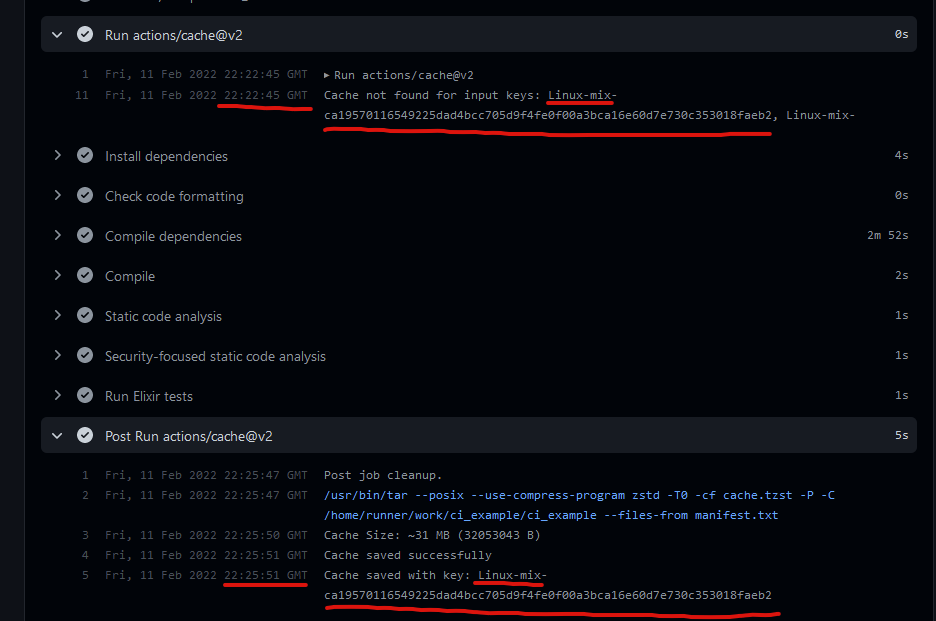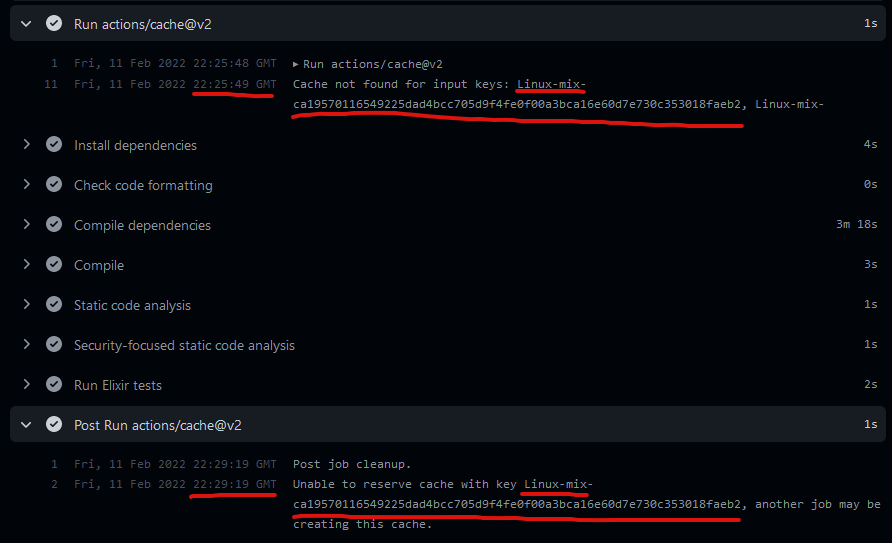Looking to speed up our build on GitHub Actions. Right now the slowest task is compiling dependencies, which takes over 3 minutes. This is surprising, because the _build folder should be cached, but it behaves as though it isn’t.
I’ve found that the command mix deps.compile does a full recompile locally too, even if I run it twice in a row. Not sure if this is a regression in Elixir 1.13 or expected behaviour?
I’ll walk through the relevant portions of the GitHub Actions config.
setup-beam
For starts, using erlef/setup-beam, which is fairly standard. I don’t know if we need to specify anything extra for rebar? This is a fairly standard Phoenix app.
env:
MIX_ENV: test
steps:
- uses: actions/checkout@v2
- uses: erlef/setup-beam@v1
with:
otp-version: "24.2.1"
elixir-version: "1.13.3"
cache
Then onto actions/cache which is using the standard example for Elixir, other than that we’ve added a v2- prefix at some point to bust an old cache.
- uses: actions/cache@v2
id: cache
with:
path: |
deps
_build
key: v2-${{ runner.os }}-mix-${{ hashFiles('**/mix.lock') }}
restore-keys: |
v2-${{ runner.os }}-mix-
download dependencies
Downloading dependencies, including some private ones, is a step that we can reliably skip if there is a cache-hit. If the lock file hasn’t changed, everything still works and these two steps take zero seconds, proving that the cache is working.
- name: Authenticating Hex
if: steps.cache.outputs.cache-hit != 'true'
run: mix hex.organization auth ${ORG_NAME} --key ${HEX_ORG_KEY}
env:
HEX_ORG_KEY: ${{ secrets.HEX_ORG_KEY }}
ORG_NAME: ${{ secrets.ORG_NAME }}
- name: Install dependencies
if: steps.cache.outputs.cache-hit != 'true'
# NOTE: AppSignal has its hooks in other dependencies, so we tell it to compile first
run: |
mix do deps.get, deps.compile appsignal --include-children
We do have some special handling for AppSignal here (which should maybe be moved into a separate step).
code formatting
We found that we can check code formatting before compiling, which saves some cycles by “failing fast.”
- name: Check code formatting
run: mix format --check-formatted
Compiling
The main event. I recently separated out the compiling of dependencies, just to see the time they take vs. our app. The dependencies take 3-4 minutes to compile, whereas our app takes about 30 seconds or so.
- name: Compile dependencies
run: |
mix deps.compile
- name: Compile
run: |
mix compile --warnings-as-errors
If I skip the deps.compile step then compile will compile all the deps.
If the mix.lock file hasn’t changed, and if the _build folder is cached, then I would hope that deps.compile would be very fast or could even be skipped.
But that isn’t the case right now. 
Further steps
There are further steps for static code analysis and running the tests (which incidentally takes less time than compiling dependencies). I’m going to stop here because it’s the compilation that I’m interested in.
If you have any suggestions, please let me know. Also happy to open a bug with Elixir if you think it’s a regression.
























